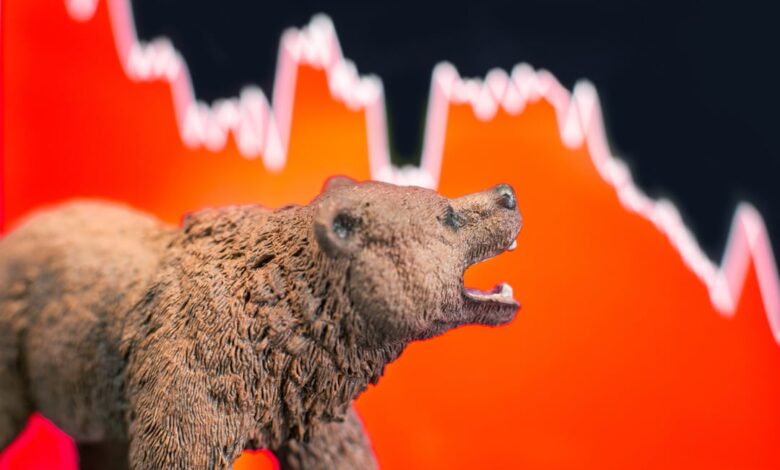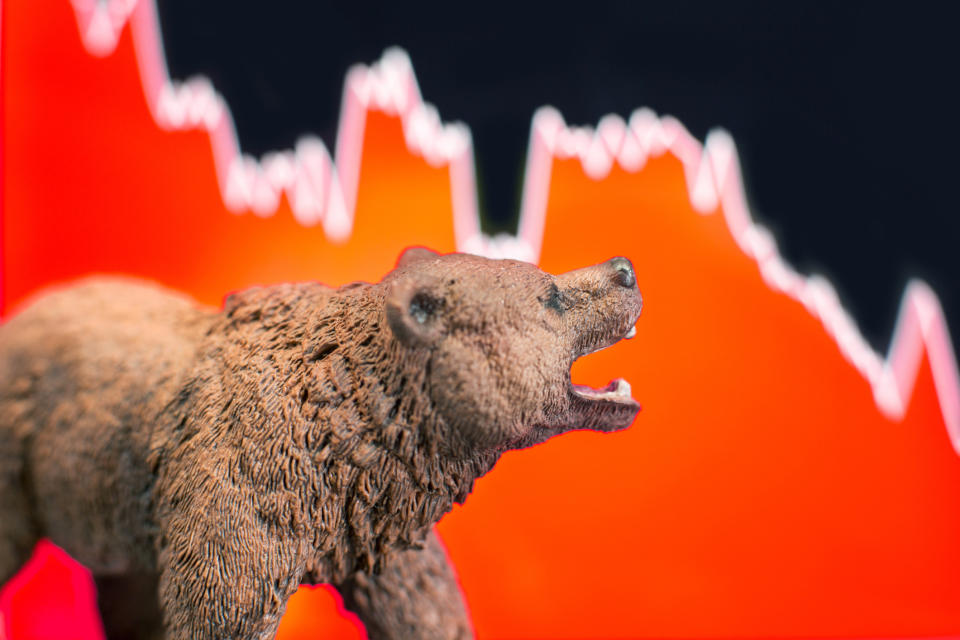
[ad_1]

There’s no question that the resolve of investors has been tested numerous times since this decade began. Wall Street’s three major stock indexes have ping-ponged between bull and bear markets on a couple of occasions over the past four years, with the growth-focused Nasdaq Composite (NASDAQINDEX: ^IXIC) gyrating the most.
As of the closing bell on Dec. 20, the Nasdaq Composite had rallied 41% year to date and nearly 45% from its 2022 bear market closing low of 10,213.29 on Dec. 28, 2022. Nevertheless, the Nasdaq remains 8% below its record-closing high, which was set in November 2021.

Short-term traders are likely to view the past 25 months as a lost period for growth stocks. But for patient investors who lean on time as an ally, dips in the Nasdaq Composite are nothing more than red-carpet opportunities to pounce on great companies at a discount.
What follows are four colossal growth stocks you’ll regret not buying in the wake of the Nasdaq bear market dip.
Alphabet
The first industry juggernaut that’s begging to be bought with the Nasdaq Composite still meaningfully below its record-closing high is Alphabet (NASDAQ: GOOGL)(NASDAQ: GOOG), the parent company of popular internet search engine Google, streaming platform YouTube, and autonomous-vehicle company Waymo, among other ventures.
The best argument I can muster for why Alphabet isn’t taking out its record high right now is because investors are worried about a recession in 2024. A couple of economic data points and predictive tools indicate that a downturn is likely in the new year. Since Alphabet generated 78% of its sales from advertising during the September-ended quarter, there’s a very real likelihood that economic weakness would sap ad spending and some of its ad pricing power (at least temporarily).
But the U.S. economy is a two-way street that very much favors optimists. While the typical recession lasts for less than a year, most periods of economic growth since the end of World War II have endured for multiple years, if not a full decade. More often than not, Alphabet is enjoying incredible ad-pricing power.
Furthermore, Google is a virtual monopoly in internet search. It held 91.54% of global search in November, per GlobalStats, and has been responsible for at least a 90% monthly share of worldwide search looking back more than eight years. This absolute dominance for Alphabet’s foundational operating segment makes it the logical choice for advertisers wanting to target potential customers.
Cloud infrastructure service provider Google Cloud is no slouch, either. Enterprise cloud spending can sustain a double-digit growth rate for a long time to come. Additionally, Google Cloud has turned in three consecutive quarters of operating profit following years of losses.
Among the widely owned FAANG stocks, Alphabet is one of the cheapest. Shares can currently be purchased for around 14x forward-year cash flow, which is well below the 18x cash flow it’s averaged over the previous five years.

Alibaba
A second colossal growth stock you’ll regret not adding to your portfolio following the Nasdaq bear market decline is China-based e-commerce behemoth Alibaba (NYSE: BABA).
Let me state upfront that China stocks come with added regulatory/oversight risks. For instance, Alibaba was fined a record $2.75 billion in 2021 by Chinese regulators for its anti-monopoly practices. There was also a period of time in 2022 where China stocks were at risk of delisting from major U.S. exchanges if Chinese companies didn’t allow U.S. regulators access to three years of audited financial statements. While these issues are now in the rearview mirror, they’re a reminder of why China stocks usually have lower price-to-earnings (P/E) ratios than U.S.-based stocks.
Nevertheless, there are plenty of reasons to be excited about Alibaba’s future. For starters, China is still in the process of bouncing back following the COVID-19 pandemic. The country’s stringent and unpredictable lockdowns wreaked havoc on supply chains. Given that China’s e-commerce industry is still in its early stages of ramping up, there’s a long growth runway in front of Alibaba as China’s economy regains its footing.
To add to the above, Alibaba dominates the e-commerce space. Data from the International Trade Administration pegs Alibaba’s online shopping sites Taobao and Tmall as collectively accounting for almost 51% of China’s e-commerce share.
Don’t overlook Alibaba’s leading cloud services segment, either. According to Canalys, Alibaba accounted for more than a third of cloud infrastructure services spending in China during the March-ended quarter. This is another sustained double-digit growth opportunity.
Alibaba stock can be purchased right now for 7x forward-year earnings, or closer to 5x forward-year earnings if you back out its more than $77 billion in net cash, cash equivalents, short-term investments, and equity securities. That’s dirt cheap for an industry leader!
Fiverr International
The third tremendous growth stock you’ll regret not scooping up following the Nasdaq bear market swoon is online-services marketplace Fiverr International (NYSE: FVRR).
Shares of Fiverr have retraced more than 90% from their all-time high, which was set during a period of investment euphoria that occurred in 2021. The company’s at-the-time nosebleed valuation, coupled with the aforementioned prospect of weaker economic growth, have worked together to push Fiverr’s shares notably lower. But after a more than two-year downtrend, Fiverr’s stock looks like a steal.
One factor clearly working in its favor is the permanent shift we’ve witnessed in the labor market. Though some workers have returned to the office with the worst of the COVID-19 pandemic now in the rearview mirror, more people have chosen to remain remote than ever before. This is music to the ears of a freelancer-driven platform like Fiverr that connects mobile workers with businesses that need their services.
Another reason Fiverr should have no trouble standing out is the company’s unique online-services marketplace. Whereas most of its competitors allow freelancers to market their tasks on an hourly basis, Fiverr freelancers are pricing their jobs as an all-in cost. The price transparency offered on Fiverr’s platform is unmatched, and it’s likely played a key role in continuously increasing spend per buyer.
But the top selling point for this fast-growing small-cap stock is its take rate — i.e., the percentage of each deal negotiated on its platform, including fees, that it gets to keep. While the take rate for its top competitors is in the mid-to-high teens, Fiverr’s take rate in the September-ended quarter expanded to 31.3%. Fiverr is continually netting more from each deal without driving away its freelancers or buyers.
A forward price-to-earnings (P/E) ratio of 12 is a phenomenal deal for a company capable of doubling its adjusted earnings per share (EPS) many times over in the years to come.
PayPal Holdings
The fourth colossal growth stock you’ll regret not buying in the wake of the Nasdaq bear market dip is none other than fintech leader PayPal Holdings (NASDAQ: PYPL).
Similar to Fiverr, PayPal’s stock has been clobbered since hitting a record high in 2021. Shares dropped more than 80% as fears of a recession picked up and the prevailing U.S. inflation rate soared.
The latter is particularly worrisome for digital payment networks. Above-average inflation has the potential to reduce the discretionary spending power of low earners. That would be bad news for fee-driven platforms like PayPal.
Despite these concerns, total payment volume (TPV) traversing PayPal’s networks has continued to grow by a low-double-digit percentage on a currency-neutral basis. Given that digital payment adoption is still in its early stages, it’s an encouraging sign that PayPal’s year-over-year TPV growth could reapproach 20% during long-winded periods of economic expansion.
PayPal’s user engagement data is even more encouraging than its steady growth in TPV. When the curtain closed on 2020, active PayPal accounts averaged 40.9 transactions over the trailing-12-month (TTM) period. But as of Sept. 30, 2023, the company’s active accounts are now averaging 56.6 transactions over the TTM. Since PayPal generates most of its revenue from fees, steady growth in usage from its active customers is a recipe for higher gross profit.
On the opposite end of the spectrum, newly appointed CEO Alex Chriss aims to stamp out operating inefficiencies and increase shareholder value. PayPal is aiming for at least $1.3 billion in cost savings in 2023 and is on track to repurchase approximately $5 billion worth of its common stock this year. This should lift the company’s operating margin and boost its EPS.
A forward P/E ratio of 11 for a company Wall Street expects to grow its EPS by 18% on an annualized basis over the next five years is too cheap to pass up.
Should you invest $1,000 in Alphabet right now?
Before you buy stock in Alphabet, consider this:
The Motley Fool Stock Advisor analyst team just identified what they believe are the 10 best stocks for investors to buy now… and Alphabet wasn’t one of them. The 10 stocks that made the cut could produce monster returns in the coming years.
Stock Advisor provides investors with an easy-to-follow blueprint for success, including guidance on building a portfolio, regular updates from analysts, and two new stock picks each month. The Stock Advisor service has more than tripled the return of S&P 500 since 2002*.
*Stock Advisor returns as of December 18, 2023
Suzanne Frey, an executive at Alphabet, is a member of The Motley Fool’s board of directors. Sean Williams has positions in Alphabet, Fiverr International, and PayPal. The Motley Fool has positions in and recommends Alphabet, Fiverr International, and PayPal. The Motley Fool recommends Alibaba Group and recommends the following options: short December 2023 $67.50 puts on PayPal. The Motley Fool has a disclosure policy.
4 Colossal Growth Stocks You’ll Regret Not Buying in the Wake of the Nasdaq Bear Market Dip was originally published by The Motley Fool
Source link




